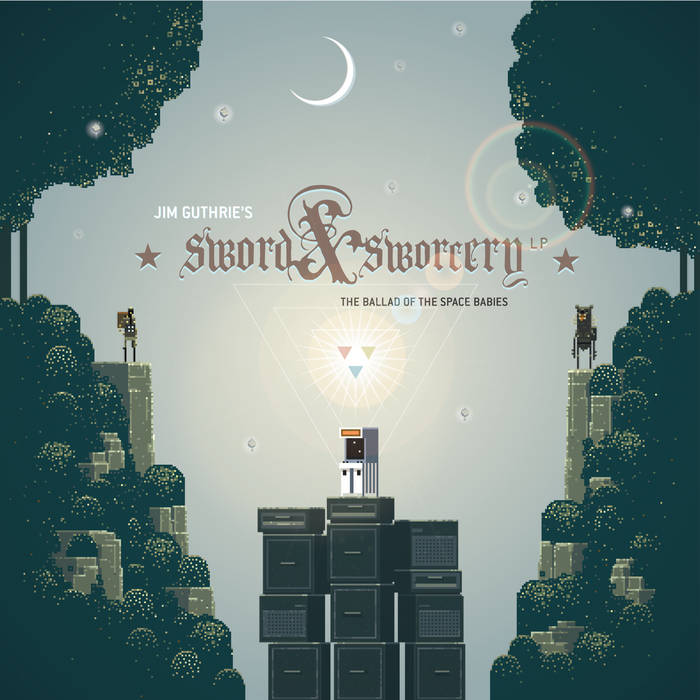
Quests and MDA
“A here exists only in relation to a there, not the other way around. There’s this only because there’s that; if we don’t look up, we’ll never know what’s down. Think of it, boy. We find ourselves only by looking at what we’re not. You can’t put your feet on the ground until you’ve touched the sky.”
-Paul Auster, Moon Palace
If every quest is as Jeff Howard says “a journey across a symbolic, fantastic, landscape” (xi), then we must first diagnose what the symbolism of Superbrothers:Sword and Sorcery EP is. The well here is deep, and resonant, but the one theme that permeates the work like soft rain, is the idea that a balance must be struck in our lives. Between sleep and dreams, between when we play games and when we step away from them, when we’re deeply in love, and when we’re deeply alone. In this age when we focus on doing the right thing, avoiding the wrong, and having priorities, Sword and Sorcery raises a finger and tells us that we must strive for moderation in things above all else. To quote the narrator of this tale:
“We think of wakefulness & the mythopoetic psychocosmology of dreams as separate states, however they interoperate in curious ways.
The threshold of liminality is a space in-between wakefulness & dreams where directed thought is impossible.
Seek the warm hearth & allow sleep to come to discover the threshold of liminality”
The Archetype
Think of sleep here as synecdoche for all aspects of life. The game itself asks you to play only in sessions–We must unite all sides of our lives not only to beat the game, but also to succeed outside the world of the game.
Mechanics: Sword and Sorcery is a game that seems to have very little pretensions of being a played as a game. It instead refers to its episodes as “sessions” that are specifically for people suffering from “acute soul sickness”, what this all means is up for interpretation but it reinforces the idea that S&S is aims to be more therapeutic than entertaining. You control a nameless warrior known only as the Sythian, by tapping where to go and what interact with. She is on a woeful errand that is in many ways, a wicked satire of the standard adventure, collecting maguffins, dueling monsters, and talking to npcs. But the main mechanic that sticks out, is when you shift worlds from the waking to the dream world, and also when you switch from the game world to reality at the end of the session. S&S wants your time away from it to be just as important as your time playing.
Dynamics: If I was to ascribe one word to describe how playing Sword and Sorcery feels like, it would be pensive—S&S is about an attitude, not story. As I played I got sucked into the music, into the feel of the world, not the story or the characters themselves. To use a metaphor, it’s more abstract than pastoral in nature. Rather than inhabiting the Sythian like most video game protagonists, I felt like we were working in partnership to complete goals. Playing the game in effect felt like reading an episodic story rather than a standard game plot as it encourages us stop and take in what you’ve experienced before continuing. The more I played it, the more I realized it is not a game about challenge or competition so much as a game about giving you dream fuel, food for thought, and other things to ponder on. As it’s name suggests, it’s more song than game—you need to let it wash over you.
Aesthetics: According to Howard, “The meanings of quest games emerge from strategic actions, but these actions have thematic, narrative, and personal implications” (xiii) we usually play games for the sheer experience, putting the world outside aside to be enveloped. There is a beauty in this, to be sure, to lose oneself to another world entirely. But according to this description, if quest games are supposed to have personal implications, which mean that there are elements besides the quest itself. Without coming back to reality, without waking from our dream it is all for naught. Constantly in S&S: EP there is a theme of waking and sleep (partaking of the mushrooms, searching logfella’s dream etc.) of fighting followed by calm, and so on. It goes back to Jeff Howard, and even further back to Joseph Campbell’s original Hero of a Thousand Faces, to quote Campbell’s book directly:
As we soon shall see, whether presented in the vast, almost oceanic images of the Orient, in the vigorous narratives of the Greeks, or in the majestic legends of the Bible, the adventure of the hero normally follows the pattern of the nuclear unit above described: a separation from the world, a penetration to some source of power, and a life-enhancing return. (33.2)
Every time we play a video game, we are in a sense inhabiting two disparate worlds. Quests by Jeff Howard’s definition and Campbell’s operate on a similar principle. A hero leaves his old world behind and enters another one, or the quest proper begins. But it’s the new beginning, the “Life-enhancing return” at the end of the adventure that makes the journey meaningful, and sadly we are forgetting that in all forms of escapism. The escape becomes all there is to it. Sword and Sorcery wants us to find meaning in both worlds… to take the third pill.
